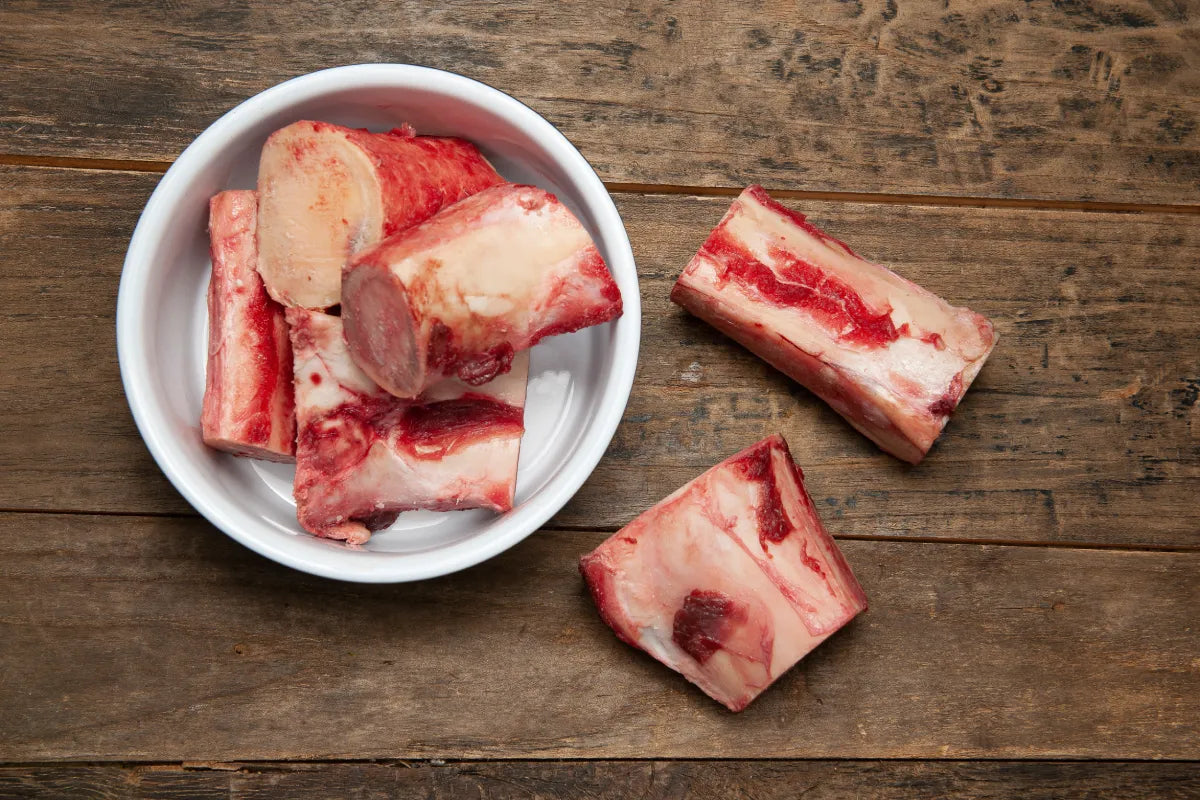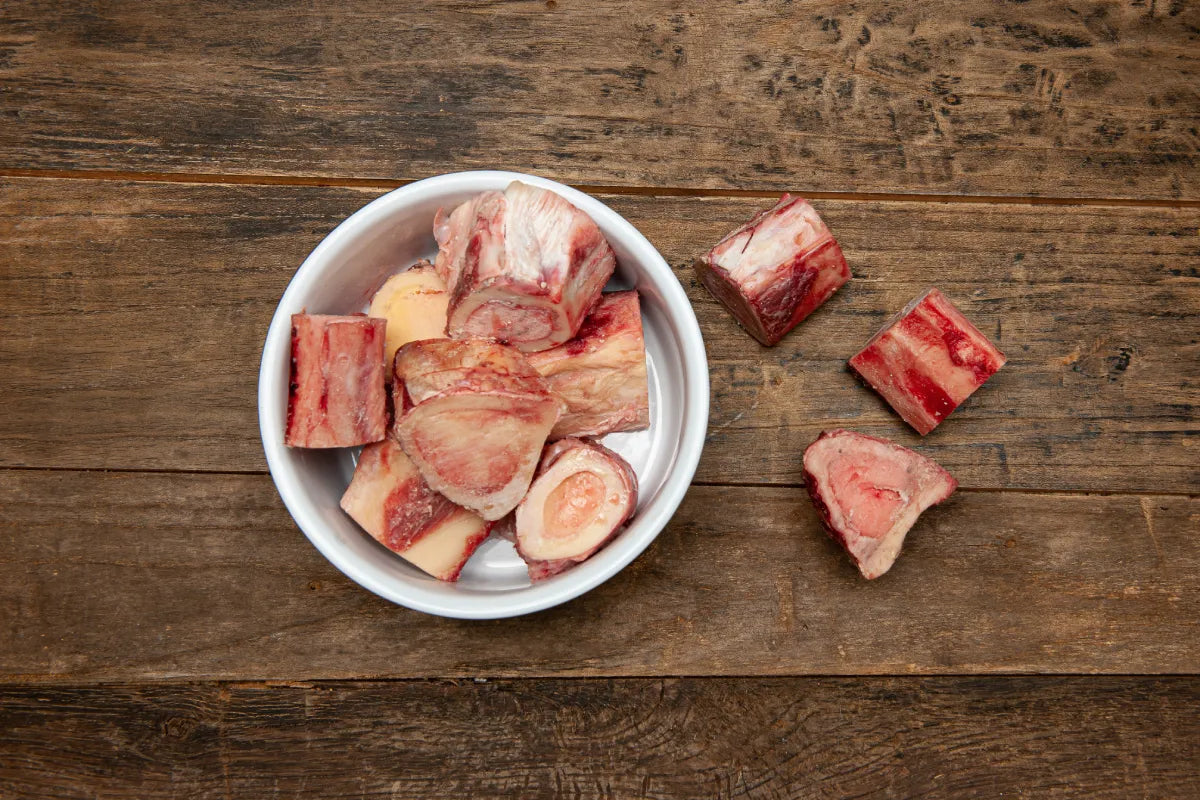Is bone marrow good for dogs? Absolutely. Bone marrow offers a natural and healthy way to improve your dog’s health while giving them the joy of having a tasty treat to gnaw - the definition of dog heaven! Bone marrow gives your four-legged friend a treasure trove of nutrients like healthy fats, proteins and vitamins. It also acts like a natural toothbrush, supporting good dental health. It’s the perfect compliment to a raw food diet for dogs.
At Acabonac Farms and Acabonac Pet, we're passionate about providing high-quality, pasture-raised meats for healthy humans and raw food for healthy pets. In this article, we’ll share some insights about the benefits of bone marrow for dogs and how it can contribute to their overall health and well-being.
Key Takeaways
- Grass-fed, raw bone marrow for dogs is a healthy treat to incorporate into a raw dog food diet.
- Bone marrow is packed with nutrients like vitamins, minerals and healthy fats that boost your dog's health. These include iron for red blood cells, collagen for healthy joints and ligaments, and B vitamins for energy metabolism.
- Chewing on raw marrow bones provides mental and physical stimulation for dogs. It mimics their natural instincts.
- Chewing on marrow bones helps scrape away plaque and prevent tartar buildup, promoting healthier gums.
What are Marrow Bones for Dogs?
Bone marrow treats for dogs are large, raw bones that contain marrow, the soft, fatty substance found in the center of bones. While marrow is available in several bones in cattle, the femur provides the richest source of marrow. Marrow bones are popular among dog owners as a natural treat and chew toy for their canine companions.
Beef marrow bones are jam-packed with nutrients that could rival any superfood. We're talking about essential fatty acids, protein, vitamins (like A and K) and minerals (like iron). It's no wonder why pet owners are intrigued by its potential health perks for their dog!

Top 6 Benefits of Feeding Raw Marrow Bones To Your Dogs
Beef marrow bones for dogs are a valuable addition to your dog's diet, offering a range of health benefits from dental hygiene to joint support and overall nutrition. Grass-fed marrow bones are especially healthy, offering higher levels of certain beneficial nutrients, including Omega-3 fatty acids, vitamins and conjugated linoleic acid.
Read on to learn more specifics about the benefits of grass-fed marrow bones from Acabonac Pet.
1. Rich Nutrients Found in Marrow Bones
Marrow bones provide a wide variety of important nutritional benefits. For example, marrow bones provide protein, which is essential for building and repairing your dog’s muscle tissue. They also contain healthy omega-3 fatty acids. These fats promote a healthy heart and good brain function. They also help regulate the immune system and contribute to your dog’s healthy skin and coat.
For the most healthy treat, try grass-fed beef marrow bones. They offer better nutrition than their grain-fed counterparts. In addition to higher levels of omega-3 fatty acids, grass-fed raw marrow bones contain conjugated linoleic acid (CLA), which is associated with reduced inflammation and a boosted immune system. Grass-fed raw marrow bones also contain zinc and selenium, which support the immune system. They have calcium and phosphorus, which are essential for strong and healthy bones, as well as the health of the renal system and multiple organs.
Marrow also contains collagen, an essential protein for the health of connective tissues, joints and skin. Grass-fed beef also is higher in Vitamin A and Vitamin E.
As you can see, the nutritional race between grass-fed and grain-fed beef is not a close one. And in addition to the nutrients in the bone, marrow bones from Acabonac Pet do not contain antibiotics and growth hormones.
2. How Marrow Bones Promote Dental Health in Dogs
Are marrow bones bad for dogs’ teeth? No. Dental health is actually one of the biggest benefits of chewing raw marrow bones. The act of gnawing scrapes away plaque on your dog's teeth. Plaque is a sticky film of bacteria that can harden into tartar. By removing plaque during chewing sessions, marrow bones help prevent tartar formation, which contributes to dental issues like gingivitis and periodontal disease.
The act of chewing on marrow bones also provides dogs with a gentle gum massage. This helps stimulate blood flow to the gums, promoting healthy gum tissue and reducing inflammation. You may also notice that your pet has a noticeable lack of bad breath.
3. Marrow Bones and Your Dog’s Digestive Health
Marrow bones contain protein, fat, vitamins, and minerals, which can support overall digestive health. Enzymes and natural minerals that come with raw bones also help cleanse your dog’s digestive tract. Digesting a raw bone can gently scrub the intestines, while minerals can make their stool firmer.
4. Bone Marrow Supports Your Pet’s Immune System and Joint Health
Marrow bones contain glucosamine and chondroitin, natural compounds that are beneficial for joint health. These substances help maintain the integrity of cartilage, cushioning the joints and promoting flexibility and mobility.
The healthy fats found in marrow bones also have properties that can help reduce inflammation in the body, including the joints. They also help boost your dog’s immune system.
5. Grass-Fed Bone Marrow Has Lower Fat Content to Support Weight Management in Dogs
Grass-fed marrow bones generally have a better fat profile than grain-fed bones, with lower levels of saturated fats and higher levels of beneficial omega-3 fatty acids. This difference in fat content can help you better manage your dog’s weight.
By enjoying a leaner source of nutrients with grass-fed marrow bones, dogs get the benefits of chewing on bones without excessive fat intake. Also, the fatty acids found in grass-fed marrow bones actually support overall health and well-being.
6. Bonus: Ethical and Environmental Benefits
Dog owners who prefer ethically and sustainably produced food for their pet will find what they seek in a raw dog food diet and the use of marrow bones as a treat.
Grass-fed beef production, such as that practiced at Acabonac Farms, allows cattle to roam freely and graze on local grasses and other vegetation. This is in sharp contrast with conventional feedlots where cattle are confined to crowded conditions. By choosing grass-fed marrow bones, consumers support more humane treatment of animals.
Acabonac Farms also practices sustainable farming methods that help maintain grasslands and promote soil health, enhancing biodiversity and carbon sequestration. Our grass-fed systems also require less water and fossil fuel inputs compared to intensive grain-fed operations.
How to Safely Include Bone Marrow in Your Dog's Diet
While marrow bones for dogs are safe, it’s also important to take precautions and ensure you feed your dog the right type of bone marrow in the best possible way. The following looks at some issues to keep in mind.
Choosing the Right Size and Type of Marrow Bone
The size of the marrow bone should be appropriate for your dog's size and breed. Larger dogs can handle larger bones, such as four-inch bones, while smaller breeds do better with smaller, 1.5-inch bones that help them avoid potential choking hazards or dental injuries. Choose a bone that is proportionate to your dog's mouth size and chewing habits. Always monitor your dog while chewing a marrow bone to ensure safety.
To Freeze or Not to Freeze Marrow Bones Before Feeding
Acabonac Pet ships its marrow bones frozen to you, and we also recommend freezing them to store them, which will help them maintain their freshness and avoid spoilage. However, bones should be thawed in the refrigerator before being fed to your dog, because frozen bones could lead to damage to their teeth and gums. Acabonac Pet does not recommend storing marrow bones for more than a day after defrosting.
Raw Marrow Bones vs Cooked Marrow Bones for Dogs
We do not recommend giving a dog a cooked marrow bone. Cooked marrow bones can splinter when a dog bites into it, leading to damage to teeth and gums. Splinters from broken bones could also lodge in a dog's digestive tract. We recommended only giving dogs uncooked, raw marrow bones.
Where to Buy Grass-Fed Dog Marrow Bones
Acabonac Pet sells both 4-inch and 1.5-inch marrow bones for dogs online. Our bone marrow comes from grass-fed, pasture-fed cattle, resulting in a higher level of nutrition and flavor than bones from grain-fed beef. Our cattle graze on our acres near the Atlantic Ocean, eating natural grasses and other vegetation grown from the rich soil. Our commitment to producing high-quality products in a sustainable, environmentally friendly way is central to everything we do.
At Acabonac Pet, you can directly purchase 100% raw food for healthy dogs. Your choices include pasteurized chicken raw dog food, 100% grass-fed beef raw dog food, and pasteurized lamb raw dog food.

So, Are Marrow Bones Good for Dogs?
Yes, marrow bones are good for your dog! Especially raw beef marrow bones from grass-fed cattle. Your dog gets the benefit of better dental health, nutrients such as protein, healthy fats, vitamins, and minerals that can contribute to a balanced diet. They also enjoy a tasty treat that provides them with stimulation, helping alleviate boredom and anxiety. As with any major dietary changes, you should consult with your veterinarian before making a change in your dog’s diet.
Frequently Asked Questions (FAQ) about Bone Marrow for Dogs
Can all dogs safely consume bone marrow?
All dogs can consume bone marrow, but it’s important to choose a raw marrow bone that matches the size of your dog. Think 4-inch bones for larger dogs and 1.5-inch bones for small dogs. Choose a bone that aligns with your dog's mouth size and chewing habits.
How often should I give my dog bone marrow?
It’s OK to offer dogs a marrow bone often, because of their health benefits. A few every week is a typical amount. Marrow bones can even replace a meal on occasion because of the high caloric count. Be sure to monitor any signs of weight gain and adjust the amount of marrow bones you give your dog accordingly.
Are there any specific types of bones I should avoid?
Do not give your dog frozen or cooked bones. Attempting to chew a frozen bone can lead to damaged teeth, while cooked bones can break into bone fragments that can cause injury to your dog’s mouth and digestive system. It’s also better to give your dogs grass-fed raw marrow bones because of their higher nutritional value.
What are the signs that my dog might not be handling bone marrow well?
Difficulty chewing a bone that is too large is a sign you need to give your dog a smaller bone. More seriously, some dogs may react to a dietary change with vomiting, loss of appetite, lethargy and diarrhea. It’s best to check with your veterinarian before making changes in your dog’s diet.
Are smoked marrow bones good for dogs?
Acabonac Pet does not recommend giving your dog a smoked marrow bone or any type of cooked marrow bone. They can break into fragments that harm your dog’s teeth and digestive tract.
Can you give dogs frozen marrow bones?
No. Acabonac Pet recommends defrosting the frozen marrow bone it sends you before giving it to your dog.
Is bone marrow bad for dogs?
No. Bone marrow is an excellent source of nutrition for dogs. It also gives your dog the happiness of chewing on a marrow bone, something that they find immensely satisfying. It’s truly a way to give your dog a special (and healthy) treat.
